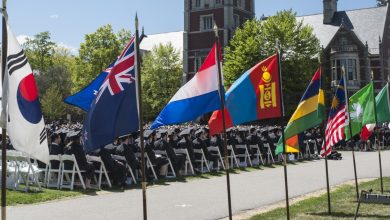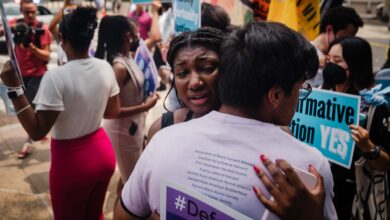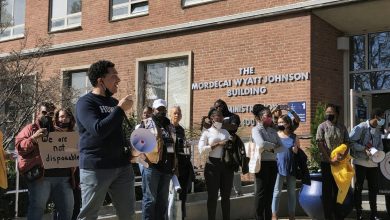Professors Are Sharply Divided on DEI Statements in Hiring, Survey Finds

As diversity statements in faculty hiring are increasingly scrutinized by Republican-controlled state legislatures, a new survey suggests that faculty members themselves are sharply divided on the issue.
The survey, the results of which were released Tuesday by the Foundation for Individual Rights and Expression, asked about 1,500 faculty members which description of diversity statements more closely aligned with their view: “a justifiable requirement for a job at a university” or “an ideological litmus test that violates academic freedom.” Half of respondents endorsed the first option, and half identified with the second.
Colleges often require or request diversity statements as part of applications for faculty jobs; candidates typically must explain how they have contributed to supporting diversity, equity, and inclusion in their academic careers. Supporters say the statements can help increase faculty diversity, ensure that the extra service work done by scholars of color — often called “invisible labor” — is recognized, and assist institutions in hiring professors who are ready to work with a diverse student population. Critics say the statements force academics to agree with progressive beliefs.
Political ideology influences faculty members’ views on mandatory DEI statements, according to the FIRE survey results. Three-fourths of liberal faculty said they were a justifiable requirement, while 56 percent of moderate faculty and 90 percent of conservative faculty considered them an ideological litmus test.
While politics is a factor, it’s not the only driver, said Nathan Honeycutt, a research fellow at FIRE who helped author a report on the survey results. While there’s a narrative that most professors support diversity statements, Honeycutt said, some faculty might be afraid to share their real opinions on the statements publicly.
“Given the context and the conversations we hear surrounding DEI, it seems like many faculty are on board,” he said. “That’s why so many universities are instituting these things, but as the numbers from our study suggest, it’s even hotly contested among faculty.”
As the use of DEI statements has become increasingly common among colleges over the past five years, the debate about them has become more heated. Some states, including Utah, West Virginia, Florida, and Texas have introduced legislation in the last two months that would ban mandatory DEI statements.
FIRE has publicly opposed DEI statements. The organization released model legislation aimed at banning such requirements on February 16.
The report noted that FIRE’s involvement with the faculty survey could have affected the results. Faculty members who identified as conservative made up 26 percent of respondents and thus were slightly overrepresented in the sample compared to other recent faculty surveys, according to the report. The survey was designed by FIRE and conducted by a market-research firm; faculty respondents came equally from a FIRE database and an education consulting firm’s database. The 1,500 professors all worked at four-year public and private colleges. The survey was conducted from July to August 2022.
The survey also found that 52 percent of faculty are afraid of losing their jobs or reputation due to a misunderstanding of their words or actions, their words or actions being taken out of context, or something from their past being posted online.
Honeycutt said it’s disheartening that faculty are so scared of losing their jobs, since academics should be able to study and discuss any topic. He worried that faculty members’ job-security fears could chill the advancement of research, with scholars afraid to challenge the established canon.
“We seem to have a climate today which is also reflected in the data, where a lot of faculty don’t feel comfortable speaking up about things,” he said.
The survey also asked faculty members whether they would support a college conducting a formal investigation into a professor, based on several hypothetical scenarios. Thirty-six percent of respondents said they’d support an investigation if a professor told a class that “all white people are racist.” Twenty percent said they’d support an investigation if a professor told a class that “it’s racist to say that all white people are racist.”
Honeycutt said he hopes faculty who feel they have to self-censor their work realize they aren’t alone after reading the report.
“We really need courageous faculty, faculty who can dissent even when it might be uncomfortable, who can ask difficult questions, who can confront those who are censoring others, or who have the courage to publicly support colleagues who are speaking up,” he said.
Source link






